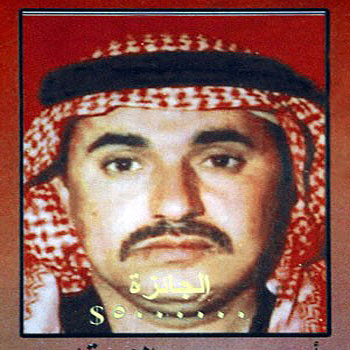
Who Was Abu Musab Al Zarqawi?
London Asharq Al-Awsat- Abu Musab al Zarqawi, the Jordanian-born terrorist responsible for major suicide bombings in Iraq as well the ruthless beheadings of foreign hostages, was killed Wednesday in a joint U.S and Iraqi military raid in Diyala, east of Baquba, Iraq.
The announcement of the death of the Al Qaeda in Iraq leader by Iraqi Prime Minister Nuri al Maliki gained applause from attending reporters as world figures welcomed the news.
Al Zarqawi, born Ahmed Fadhil al Khalayleh, emerged in late 2003, as the leader of the group “Tawhid and Jihad” or “Monotheism and Holy War.” In October 2004, the group announced on the Internet that it had sworn allegiance to Al Qaeda and Bin Laden had renamed the group Al Qaeda in Iraq. Osama bin Laden named Zarqawi as his deputy in Iraq after he pledged allegiance to the overall Al Qaeda leader in 2004 and called Zarqawi the prince of Al Qaeda in Iraq.
Al Qaeda in Iraq has claimed responsibility for some of the most violent acts of terrorism since the U.S occupation began in 2003. It is widely believed that Al Zarqawi personally beheaded at least two American hostages, Nicholas Berg in
April 2004 and Eugene Armstrong in September 2004. Furthermore, the Al Qaeda leader claimed responsibility for the triple suicide bombings in Amman that killed 60 people in luxury hotels in the Jordanian capital.
Al Zarqawi’s death has raised hopes that security in Iraq will be able to improve, as he is believed to have played a major role in inflaming sectarian violence in Iraq.
However, there are fears that Zarqawi’s death will be the cause of revenge attacks from his successors and supporters.
Zarqawi, believed to be in his late 30s, has inspired an apparently endless supply of militants from across the Arab world to blow themselves up in suicide missions in Iraq.
Iraqi and U.S. officials say he had formed a loose alliance with Saddam Hussein’s former agents, benefiting from their money, weapons and intelligence assets to press his campaign.
Al Qaeda in Iraq pledged to continue fighting. “We tell our Emir, Sheikh Bin Laden, your soldiers in Al Qaeda in Iraq will continue along the same path that you set out for Abu Musab Al Zarqawi,” said a statement on an Islamist Web site.
Analysts agreed that Al Zarqawi’s death would change the face of the insurgency in Iraq though not end it. “He was emerging as the most formidable terrorist in the world,” said Rohan Gunaratna, head of terrorism research at the Singapore-based Institute of Defense and Strategic Studies. “Al-Zarqawi was not only the most active terrorist in Iraq but also the most ruthless.” Gunaratna said he expected the Iraqi insurgency to continue but with fewer suicide attacks and beheadings that were the trademark of Al Zarqawi’s movement. He noted that Al Zarqawi had built an international network that compared to Osama Bin Laden’s. Gunaratna said Al Zarqawi had greater appeal to radical militants than Bin Laden because “he was leading the fight from the front lines.” “His death is a massive blow to the global jihad movement. They have lost their most active, coordinating leader,” Gunaratna said. “Al Zarqawi’s death will not diminish the scale of violence in Iraq but certainly will reduce the threat to its neighbors.”
Al Zarqawi rose from a tough street life in the Jordanian industrial town of Zarqa, from which he eventually took his nom de guerre. He solidified his Islamic radical ideology while in a Jordanian prison in the late 1990s. After being released in an amnesty, Al Zarqawi went to Afghanistan in 1999, where he formed links with Bin Laden. He fled during the U.S.-led war that ousted the Taliban in late 2001, passing through Iran to Iraq, according to U.S. officials and militant biographies of Al Zarqawi posted on the Web.
Members of Abu Musab Al Zarqawi’s family gathered to mourn the death of the notorious Al Qaeda in Iraq leader who they had disavowed last year after an attack on civilians in Jordan. “We anticipated that he would be killed for a very long time,” Sayel al Khalayleh said. “We expected that he would be martyred,” he added, in a low voice, signaling his grief over the death of his brother. “We hope that he will join other martyrs in heaven,” said Sayel.
Al Khalayleh was one of 57 family members who signed a newspaper advertisement to disavow Al Zarqawi after the suicide bombings in Amman last November and reiterated their strong allegiance to the king. His use of the term martyr poses no contradiction for religious Arab Muslim opponents of the U.S. presence in Iraq who believe that death at the hands of an ‘occupying force’ confers martyrdom status on the deceased.
Jordan’s State Security Court had sentenced Al Zarqawi to death in absentia three times for involvement in terror plots against his native country. One of the attacks was the assassination of U.S. aid official Laurence Foley, who was gunned down in Amman in 2002.
American President George Bush said the death of Zarqawi “is a severe blow to Al Qaeda,” a victory in the war on terrorism, and “an opportunity for Iraq’s new government to turn the tide in this struggle.”
Iraqi Prime Minister at the TV news conference to announce Zarqawi’s killing stated, “The success we are looking for, a stable Iraq, requires more effort… but we can say that we have had a good start.”
Two F-16 warplanes bombed the site where Abu Musab Al Zarqawi was killed in Iraq, military spokesman Major General William Caldwell said on Thursday. He said two 500-pound bombs were dropped.

Who Was Abu Musab Al Zarqawi?

Who Was Abu Musab Al Zarqawi?

Who Was Abu Musab Al Zarqawi?
